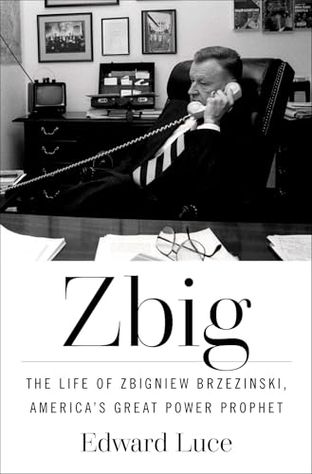Review of Zbig
by Johny McFliggen, PhD Literature & Business, Oxford
In the labyrinthine halls of Cold War strategy, few figures loom as large as Zbigniew Brzezinski, and "Zbig: The Strategy and Statecraft of Zbigniew Brzezinski," edited by Edward Luce, is a compelling tribute to his legacy. This book reads less like a biography and more like a cerebral chess match where Brzezinski’s moves are analyzed with the precision of a grandmaster. If you’re familiar with Luce’s work at the Financial Times, you’ll appreciate his deft ability to weave a narrative that’s both intricate and expansive, akin to watching a season of "The West Wing" with geopolitics as its central plot.
Edward Luce, in his editorial role, demonstrates his dexterity in distilling the intricacies of Brzezinski's mind—a mind that operated at the confluence of ideology and pragmatism. Luce does not merely recount historical events; he dissects them, much like a seasoned surgeon operating with a scalpel rather than a cleaver. The book delves into Brzezinski's pivotal role during President Carter’s administration, highlighting his strategic acumen in managing the Soviet Union’s decline and championing human rights. These themes are not just revisited; they are revitalized through Luce's scholarly lens.
Public reception has been kind to "Zbig," lauding its thorough research and balanced narrative. However, it is not without its challenges. For the uninitiated, the dense tapestry of Cold War politics might feel like navigating a particularly verbose episode of "Game of Thrones" without a map. Yet for those willing to immerse themselves, the payoff is substantial. The book stands as a testament to Brzezinski’s distinctive blend of realism and idealism—a cocktail that would likely be over-the-top in any other context but is here served with finesse.
In the arena of Cold War literature, "Zbig" finds itself amidst giants like Brzezinski's own "The Grand Chessboard" and Niall Ferguson’s "Kissinger: 1923-1968: The Idealist." Each work offers a unique lens on the strategic machinations of their subjects. Where Kissinger is often seen as the Machiavellian puppet master, Brzezinski emerges from Luce's pages as a philosopher-king, balancing moral imperatives with realpolitik in a way reminiscent of Jean-Luc Picard navigating the Prime Directive.
Awards may not yet have adorned this book’s cover, but its recognition is found in academic circles and policy-making discussions. It remains a crucial text for understanding the intellectual underpinnings of U.S. foreign policy during a time when the world teetered on the brink of change. For readers with a penchant for the cerebral and the strategically complex, "Zbig" is an indispensable addition to their library—a work that demands engagement and rewards it manifold. In a world where nuance is often sacrificed at the altar of brevity, Luce's editorial contribution is both timely and timeless.
Purchase Link: Zbig on Amazon



